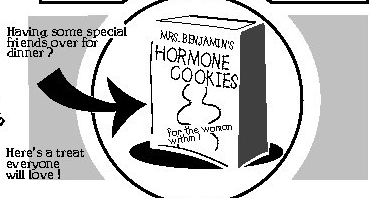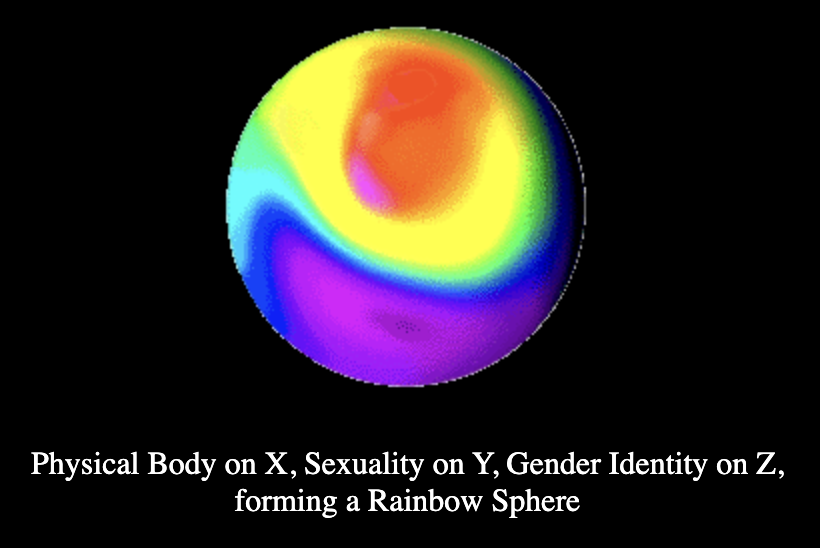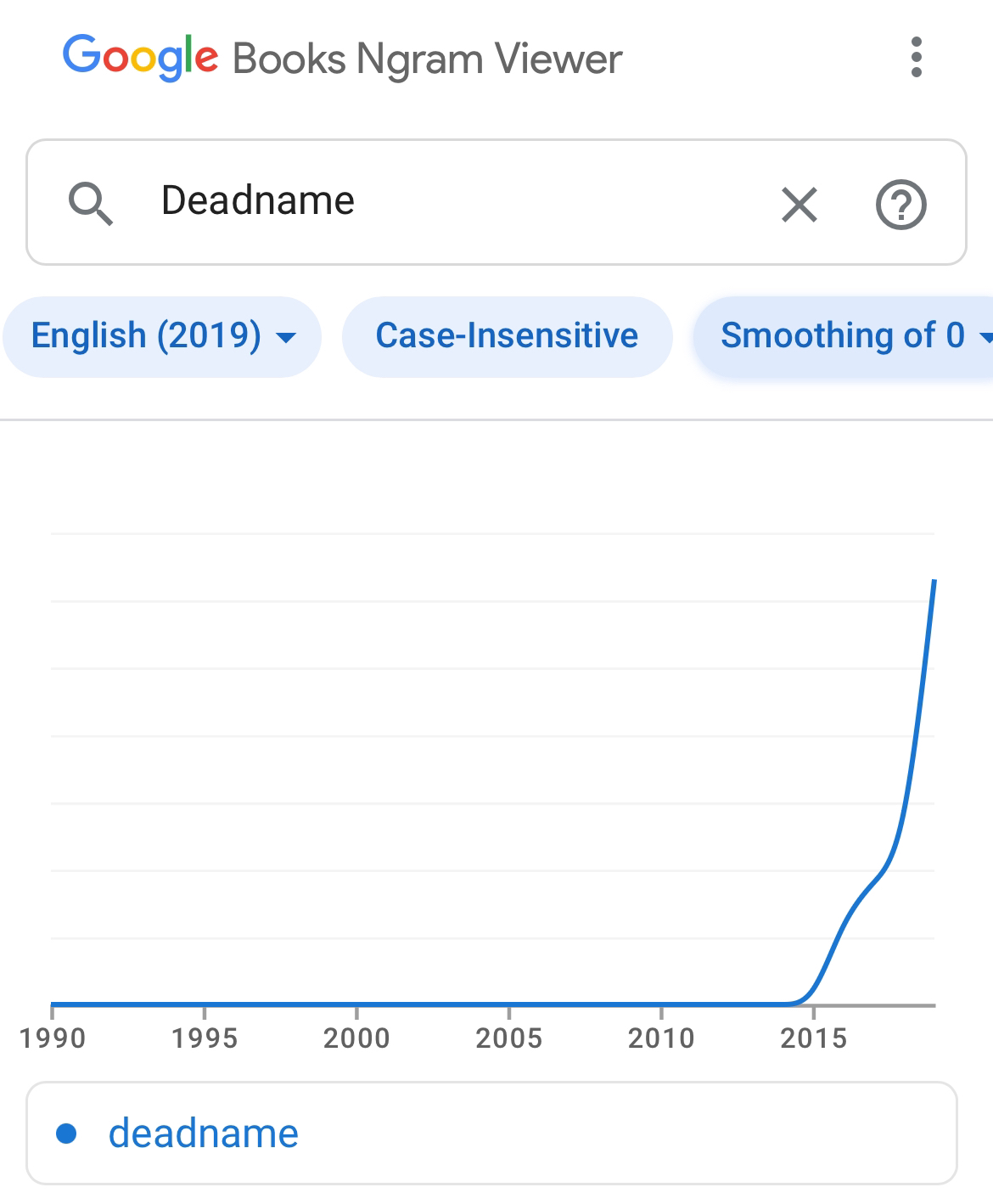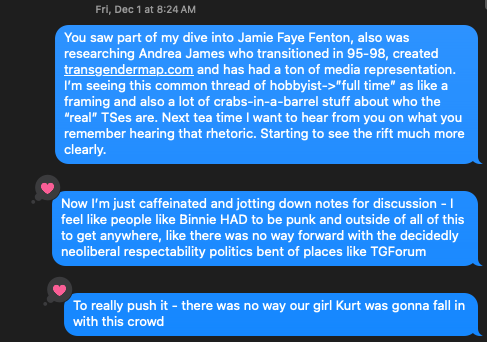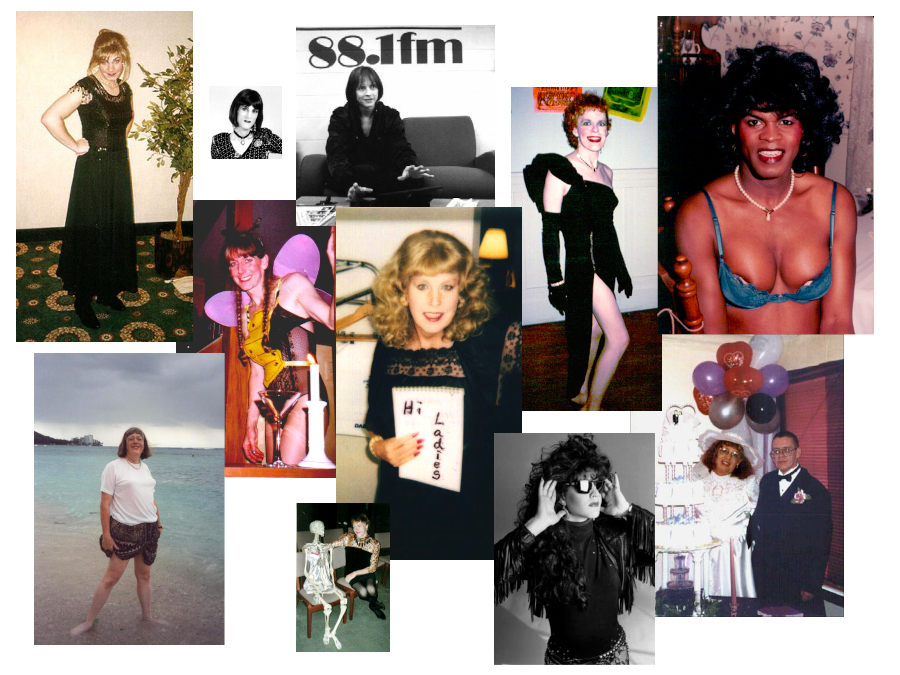I’ll preface this blogpost with an admittance that I’ve written a messy ramble through multiple topics tangled in my mind right now. This is just another one of those entries where it’s more important that I get something down now than continue to refine.
TransGender Forum
At the end of November my friend Alana shared with me an archive she had found of TransGenderForum, a transgender special interest website from the late 1990s. We spent several days digging through the pages of the site, reading articles, looking at pictures of members and events, and discussing the differences between trans culture then and now. In my grasp to understand the modern concept of transness I keep encountering what feels to me like a rift between the 20th century’s conceptualization of what it means to be transgender and that of the present day. Reading through TGForum seemed like a way to gain perspective on the other side of that rift. Alana is from Gen-X and wrestled with the earlier understanding of transness when she first approached coming out in the 2000s, and so she had some familiarity with what we were reading in the TGForum archive, but I was seeing most of it with fresh eyes. To contrast with the present understanding, Julia Serano’s Whipping Girl seems like a foundational text for most of the language we use to describe trans people (and especially the transfeminine experience), but it came out as recently as 2007.
It’s worth noting that because this is the mid-90s internet that we’re talking about, visitors and members of TGForum tended to be white, affluent, and tech-adjacent. TGForum isn’t a broader picture of what it meant to be trans at the time, it’s a specific subset of the experience. Also nearly everyone using the site was AMAB. There’s a small section on transmasc issues and information, but the bulk of the site is dominated by transfems.
“Transfem” is honestly a sloppy label to apply because contemporary terminology is quite different from the categories people identified with back then. For most of the 20th century the “gender community” was a melting pot of CDs (crossdressers), TVs (transvestites), DQs (drag queens), TSes (transsexuals), and TGs (transgender people). “Transgender” could refer to nearly anyone in that list, it meant something more like anyone who tampered with their assigned gender either occasionally or permanently. To be transgender was to sit somewhere between a hobby and a pathological condition - sometimes the TVs talked about going “full time,” as opposed to, say, being a girl on the weekends. Several articles talk about TVs going through cycles of purging their clothes and makeup to swear the whole thing off, only to find themselves “dressing” again. Other people write in ways that show their struggles with what we now call gender dysphoria. There’s a lot of fun slang, like “genetic girl” instead of cisgender woman, or being “read” instead of clocked.
I can imagine that for many people experiencing feelings of gender incongruity, community like TGForum was a double edged sword. On the one hand, the framing of transness a hobby or interest could make engaging with their feelings around gender seem easier and more palatable to themselves and others. On the other hand, the 90s concept of what it meant to be transgender did little to affirm those who felt compelled to permanently change their sex, and in fact was largely unsympathetic unless you checked all of the boxes that institutions of the time expected. Doctors following the Harry Benjamin Standards of Care (SOC) required individuals seeking hormones to undertake the “real life test” (RLT) of living in their desired gender for a year before they could get a prescription. This was an impossible hurdle for most. By the early 90s research was starting to come out that the RLT was harming transgender people, but the WPATH (then HBIGDA) did not completely drop the requirement in their standards of care until 2017.
Another complicating factor in what it meant to be trans at the time was the relationship of the gender community with gay communities and gay rights activism. The transnormative narrative that one was required to reiterate in order to receive healthcare was that one had known since they were a child that they were trans, and that they were heterosexual (attracted to the opposite of their desired sex). As we know today, the vast majority of transgender people are homosexual, so many were turned away by this requirement (or more likely gave up early due to the chilling effect). Culturally gay people remained to be accepted by the culture at large, so many TVs and TSes were low-key homophobic. Additionally the gay activist community had spurned, trampled, and strategically jettisoned trans activists since Stonewall in the 1970s and later with ACT UP, so many transgender organizations were leery of building bridges with groups that they saw as inherently hostile.
There’s an assumption on TGForum that the reader is a straight AMAB, often married. T4T doesn’t seem to be discussed much. It seems like if one was a TV it was acceptable to have a wife or an interest in women; once one became a TS attraction to men was expected. There’s some talk of bisexuality in the personal ads, which maybe signals the shifting sexual mores. There are articles on how to break the news to one’s wife about crossdressing, including an incredible sample by a very straight “Genetic Girl” wife about how she’s not a lesbian, but having sex with her TV wife for the first time was the best she ever had:
Although I have never had a lesbian encounter, nor do I ever intend to seek one, I nonetheless have the opportunity, through Vanessa, to explore fantasies. I admit to liking her breasts, and her shaved body - I enjoy the smoothness of it. I encouraged her to have her ears pierced, and find the dangly earrings a real turn-on. When she puts on a black, lace teddy I bought her for her birthday, with garters and stockings, it is an incredible turn-on. If she underdresses (wearing women's lingerie under male clothes,) I think about it all day and imagine what the night might bring.
From I Like It! by Linda Kaye
It seems to me like a lot of the TV/TS culture of places like TGForum had internalized the SOC, which led many transitioned members to embrace AGP later on. Because of their privilege, many members of the site failed to recognize their positionality and therefore the degree to which their "hobby/lifestyle" was predicated on respectability politics. Stealth is assumed as an endpoint for the TSes; to fit into the world as a cis straight woman is the only way to go once one is no longer a TV. This probably reinforced a Dead Sea Effect when it came to activism, if I can speculate - once you were passing and stealth, engaging in political action was incredibly risky, so why stick around?
A Young Culture
Alana found several WAV files embedded in the archive that were sound clips from the 1953 movie Glen or Glenda by the notoriously untalented transvestite filmmaker Ed Wood, and so after a giggle from a few quotes I decided to watch the whole film. Glen or Glenda is a product of its time, coming hot off the heels of Christine Jorgensen’s internationally hyped sex change. The premise of the movie is that there are two kinds of individuals who feel the need to crossdress - transvestites who are projecting their “love object” onto a fictional character (their alter ego) instead of their spouse because of problems in their upbringing, and hermaphrodites or “pseudo-hermaphrodites” (intersex people) who require a sex change in order to align themselves with their preferred sex. The main character of the first of two stories, Glen/Glenda, struggles with his desires to crossdress, and experiences some trippy montage sequences before deciding to tell his fiancee of his “condition” and seek professional help.
The movie tries to be sympathetic towards the crossdresser - it treats Glen’s desires as a largely harmless quirk and a solvable problem - but can’t seem to make it’s mind up on whether or not crossdressing is good, actually. There’s some strange bits where our director and writer Wood seems to suggest that womens’ clothes are inherently superior to mens’ - not the first time I’ve heard this assertion from an egg (the author herself has been found guilty on more than one occasion). From my perspective, the 1950s Glen or Glenda model of TV/TS seems almost identical to that of the TGForum members in the 1990s, with a few adjustments for technology and medical care. I felt surprised that things seemed as conceptually stagnant, compared to the progress that had been occurring in other fields like feminism.
Given this seeming inertia, it’s been startling to me to reflect on how extremely young our contemporary concept of transness must be. Part of the difference comes from general framing (people are born trans, it’s not a mental illness), part of that is the recent radical shifts in standards of care, but also culturally there’s a lot of new language, like “cisgender” as opposed to “genetic” for instance. On a whim I hit up Google Trends and Ngram to see how often people have been using “deadname”, and was surprised to see that the term dated back to the early 2010s:
As attitudes about sexual orientation, queerness, the invalidity of the binary, etc. shifted in younger populations, there wasn't a bridge between groups like TGForum and people finding their gender identity through non-stereotypical crossdressy means. I can see how the TVs and TSes might have found more radical concepts of gender and sexuality as threatening, because it undermined the legibility they thought that they were finding to larger society. But with the benefit of hindsight, it looks to me like that respectability was a fight for table scraps. Op-eds gushing about the appearance of a stereotypical crossdresser In Twin Peaks or Patrick Swayze’s performance in the movie To Wong Foo: Thanks for Everything! strike me as kind of desperate. I find myself thinking back to Grace Lavery’s recent assertions in Pleasure and Efficacy that transgender people effectively destroy ontologies. We hinder ourselves when we try to fit the mold that society offers us.
So now when I hear someone bring up every transfem’s favorite speculative history - “what if Kurt Cobain had come out as trans?” Or someone asks “why didn’t the Wachowskis transition sooner if they were making movies like Bound in the 90s?” - I feel like I have a definitive answer. TV/TS culture was an evolutionary dead-end. While there’s credit to be given for some of the activism of the late 90s, that culture held little regard for breaking taboos, for embracing queerness, for going against the grain. It was largely conservative and there was no room for radical elements. Our modern transness seems to have come largely from elsewhere.
In some ways, this has been a relief to discover. While people talk about the long history of transgender people, to know that the modern understanding of transness is less than 20 years old means that in many ways the trans people of today are pioneering the interaction between society and ourselves in venues that our predecessors did not. When I feel like I’m struggling against oppressive systems, confused authorities and well-meaning but often clueless community members, I can put that in the context of a lack of understanding in most cases as opposed to outright transphobia. It means that the exhaustion that I and my peers face when furthering our transitions is often new inroads for everyone involved. We are defining processes for coming out at work, we are educating our healthcare workers, we are being visible on our own terms and setting expectations for how trans people should be treated. We struggle not because we’re incapable, but because we are early in the history of integration of trans people into our current society and every day we each blaze a new trail.
Finding Elders
I first became interested in trans aging several months ago when I watched the documentary The Stroll by filmmaker Kristen Lovell. Lovell is a trans woman of color who worked as a sex worker in the meatpacking district of NYC in the 1980s. Lovell’s documentary focuses on her and her peers’ experiences in sex work, encounters with the law, and evolving NYC culture, combining footage from TV and films of the time with animations and present-day interviews to paint a picture of how life in the district changed radically over the past 40 years. Many of the women and people who were interviewed are now in their 60s, and to see and hear them describe the arcs of their lives was incredible. I haven’t crossed paths with many trans women much older than me, most events I’ve attended seem to be comprised of millennials and boomers. Watching The Stroll made me curious about what my life might look like 40 years down the road, and what kind of old woman I will be.
As I combed through the TGForum archive, I began looking online for members who provided a full name, because I wanted to see where their lives had led them. Most of the time I was unsuccessful, but sometimes I’d turn up a retiree on Facebook or a LinkedIn profile without a photo. Seeing these aging trans women, their RLTs and awkward crossdressing phases far in the past, warmed my heart. Some of the forum members turned out to double down on the gatekeeping standards that they struggled against in their early transitions, advocating for vetting to make sure only “true transsexuals” were receiving HRT and other care. Others grew beyond communities like TGForum, and became activists and educators. I found the website Outwords, an archive of recent interviews with LGBTQ+ historical and cultural figures, and I tracked down interviews with some amazing women connected to TGForum like Nancy Nangeroni and Jessica Xavier. Hearing these women in their 70s talk about their experiences mobilizing community and demonstrate a keen understanding of contemporary gender politics and how it relates to their own self-concepts frankly blew me away. I feel like for the first time in my life I have role models.
A couple of weeks after our first deep dive, Alana and I decided to join the Northwest Gender Alliance (NWGA) for one of their monthly dinners. The NWGA started out in 1980 as a crossdresser organization that admitted transsexuals, but since then many of the members went on to transition. The NWGA folks that we met at dinner were in their late 60s to late 70s, and I spent the evening listening to these women tell stories about their lives before and after coming out, how they’ve conceptualized themselves over time, and what transition has meant for them.
In the same way that my first in-person support group put me immediately at ease, my initial nerves about meeting trans women 30+ years my senior were calmed as quickly as we sat down to eat. It may sound trite, but: old trans women are old women. That’s it. They were funny, and sharp witted, and thoughtful about their feelings and experiences, and even got a little flirty with me! Although some of the women there might not have liked the label, they were also queer in a very queer magnetism way. One gal said that she was 77, had a lesbian daughter and daughter-in-law living with her, 3 girlfriends to go on dates with over the next weekend, and oh yeah, her unsupportive wife lived out back in a shed. She was beaming telling me about her queer little family, and I felt such a connection to her. I heard so many phrases that have bubbled out of my peers’ mouths before, like “I threw myself into working out and grew a beard to hide my face,” and “I joined the Navy hoping it would make a man out of me,” and “I thought I was an introvert, but since transition I’ve turned into a social butterfly.” We have always been here and will always exist.
Conclusions
I have a lot more reading to do on transgender history, and thankfully Christmas brought me quite a few books to work through. Although I have so many more questions about the culture shift of the past 20 years in trans communities, I’m feeling so empowered about what the future might bring for me personally and for trans people as a whole. I realize that I live in a little bubble of liberal safety in Portland, and that things are dire for many trans people in the US right now, but I believe that we will persist and someday thrive. Our culture is young, we are each blazing so many new trails, and we are so capable and strong. Let’s plan to grow old together.

